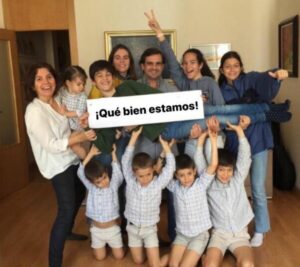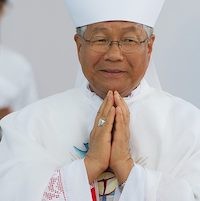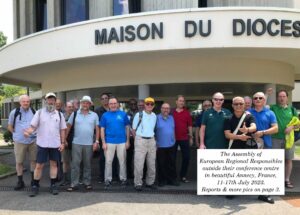Category Archives: Documentos
HOW WELL WE ARE! Juan Carlos MARTÍNEZ, and Ana URDIALES
 Given that we make up one very large family from Cartagena, Spain, the year 2020 was a stupendous opportunity, as” thanks” to the Covid pandemic, to the enforced confinement and to the time restrictions on the roads, we were able to spend more time than normal enjoying life together.
Given that we make up one very large family from Cartagena, Spain, the year 2020 was a stupendous opportunity, as” thanks” to the Covid pandemic, to the enforced confinement and to the time restrictions on the roads, we were able to spend more time than normal enjoying life together.
However, 2021 came and, when it seemed that the pandemic was coming under control, a succession of events was set in motion, which threatened to disturb our family peace. That’s
where our phrase How well we are! Took on more meaning than ever. For us this phrase is a way of giving thanks to God and also an expression of abandonment, because we have the full
conviction that we are well because we are in the best hands, the hands of God. We all know what Charles de Foucauld wants to express in the Prayer of Abandonment, and that it is a doorway to hope.
Read the full document in PDF: HOW WELL WE ARE!! Juan Carlos MARTÍNEZ, and Ana URDIALES
(Italiano) Piccoli Fratelli di Jesus Caritas, gennaio 2024
(Italiano) Piccole sorelle di Gesù. Notizie nr 48
(Italiano) Piccoli Fratelli di Jesus Caritas, dicembre 2023
BE HAPPY AS PRIESTS. Cardinal Lazzaro YOU HUENG-SIK
First of all, THANK YOU for your presence here, but much more for your service to the People of God, your dedication to the people who is entrusted, day after day and especially in the recent pandemic thatIt has been for us, ministers of God, a time that has put us to tough test for everyone.
I am happy to be able to meet you today and have this opportunity to look with you at my life and our life. I speak to you with an open heart, without formalities, and therefore I begin with first of all tell you something about myself and also after that, from time to time when I will share with you something about my life.
An option that must always be renewed
When Pope Francis told me in April 2021 that he wanted calling me to Rome to become Prefect of the Dicastery for the Clergy, I took a scare I would never have imagined working one day in the Vatican, far from my land and far from my people. In Korea I was a happy bishop, committed together with my diocese on a promising path after the footprints of our martyrs. Pope Francis had come to us in the diocese for Asian Youth Day and had emerged interesting initiatives. We had also held a diocesan Synod that brought together priests and lay people, and I was building a new Curia diocesan.
And this call came, this request from the Pope. I told him: “But I am a peasant, son of peasants.” The Pope was not impressed by that.
Read the full document in PDF format: BE HAPPY AS PRIESTS. Cardinal Lazzaro YOU HUENG-SIK eng
LET BE BORN IN YOU. Diego MELENDO MOLERO
The switching on of Christmas lights is a bigger event every year, and the number of lights lit is a reason for competition between different cities. The temptation of posturing, appearance, superficiality….
Read the full document in PDF: LET IT BE BORN IN YOU, Diego MELENDO MOLERO eng
(Français) Charles de FOUCAULD, de la disssipation à la sainteté. José MAIGRE
(Italiano) Piccoli Fratelli di Jesus Caritas. Noviembre 2023
Be Brothers. Britain & Ireland. November 2023
- Editorial
- Fraternity news
- Annecy reports
- British July retreat
- British accounts
- British responsibles’
- September meeting
- Emails to the Editor
- Your recruiting
- Publications received
- Reminders
Read the full issue on PDF format: Be Brothers November 2023





